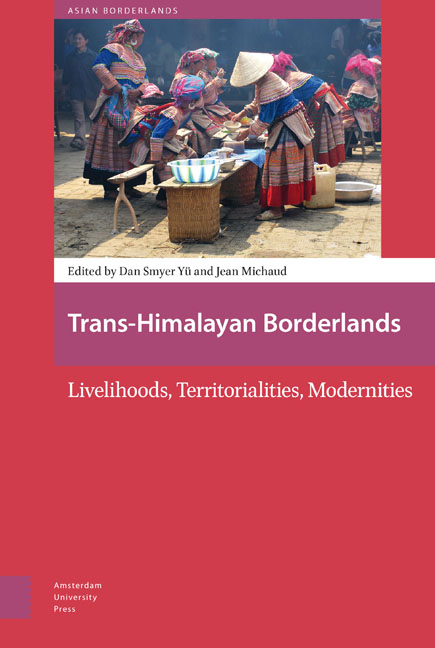Book contents
- Frontmatter
- Contents
- Acknowledgements
- Introduction: Trans-Himalayas as Multistate Margins
- I Territory, Worldviews, and Power Through Time
- 1 Adjusting Livelihood Structure in the Southeast Asian Massif
- 2 The Properties of Territory in Nepal’s State of Transformation
- 3 Trans-Himalayan Buddhist Secularities: Sino-Indian Geopolitics of Territoriality in Indo-Tibetan Interface
- 4 Buddhist Books on Trans-Himalayan Pathways: Materials and Technologies Connecting People and Ecological Environments in a Transnational Landscape
- 5 Seeking China's Back Door: On English Handkerchiefs and Global Local Markets in the Early Nineteenth Century
- II Livelihood Reconstructions, Flows, and Trans-Himalayan Modernities
- 6 Contested Modernities: Place, Subjectivity, and Himalayan Dam Infrastructures
- 7 Plurality and Plasticity of Everyday Humanitarianism in the Karen Conflict
- 8 Being Modern: Livelihood Reconstruction among Land-lost Peasants in Chenggong (Kunming)
- 9 Tibetan Wine Production, Taste of Place, and Regional Niche Identities in Shangri-La, China
- 10 Tea and Merit: Landscape Making in the Ritual Lives of the De’ang People in Western Yunnan
- 11 In-between Poppy and Rubber Fields: Experimenting a Transborder Livelihood among the Akha in the Northwestern Frontier of Laos
- 12 A Fortuitous Frontier Opportunity: Cardamom Livelihoods in the Sino-Vietnamese Borderlands
- Conclusion: Frictions in Trans-Himalayan Studies
- Index
6 - Contested Modernities: Place, Subjectivity, and Himalayan Dam Infrastructures
Published online by Cambridge University Press: 12 December 2020
- Frontmatter
- Contents
- Acknowledgements
- Introduction: Trans-Himalayas as Multistate Margins
- I Territory, Worldviews, and Power Through Time
- 1 Adjusting Livelihood Structure in the Southeast Asian Massif
- 2 The Properties of Territory in Nepal’s State of Transformation
- 3 Trans-Himalayan Buddhist Secularities: Sino-Indian Geopolitics of Territoriality in Indo-Tibetan Interface
- 4 Buddhist Books on Trans-Himalayan Pathways: Materials and Technologies Connecting People and Ecological Environments in a Transnational Landscape
- 5 Seeking China's Back Door: On English Handkerchiefs and Global Local Markets in the Early Nineteenth Century
- II Livelihood Reconstructions, Flows, and Trans-Himalayan Modernities
- 6 Contested Modernities: Place, Subjectivity, and Himalayan Dam Infrastructures
- 7 Plurality and Plasticity of Everyday Humanitarianism in the Karen Conflict
- 8 Being Modern: Livelihood Reconstruction among Land-lost Peasants in Chenggong (Kunming)
- 9 Tibetan Wine Production, Taste of Place, and Regional Niche Identities in Shangri-La, China
- 10 Tea and Merit: Landscape Making in the Ritual Lives of the De’ang People in Western Yunnan
- 11 In-between Poppy and Rubber Fields: Experimenting a Transborder Livelihood among the Akha in the Northwestern Frontier of Laos
- 12 A Fortuitous Frontier Opportunity: Cardamom Livelihoods in the Sino-Vietnamese Borderlands
- Conclusion: Frictions in Trans-Himalayan Studies
- Index
Summary
Abstract
The Himalaya are a final frontier for much of the world's dam infrastructure. When set within seemingly remote border areas, these projects intersect with sociocultural landscapes in ways that reveal nuance in how the development agenda is accepted, adapted, resisted, or rejected. Focusing on a contested dam built along the Ganges – a river sacred to Hindus – in the Indian Himalaya, this chapter explores a diversity of responses to hydroelectric development alongside the mixed evaluations that interlocutors expressed about the projects of modernization and modernity. Analyzing these complexities, the chapter considers if the selective concession to dams in the Himalaya enable a better appreciation of the contested modernities that may be evident in the mountains that serve as Asia's ‘water tower.’
Keywords: Ganges/Ganga River, Tehri Dam, Hinduism, Himalaya, subjectivity, modernity
The proliferation of hydroelectric projects across the Himalaya leads to the transformation of a wide range of mountain landscapes. While the displacement concerns and environmental impacts involved in the creation of these projects are often recognized (Dharmadhikary 2008), the developmental gains they offer to governments frequently take priority. Amid the environment-versus-development debates that emerge in public and governmental realms, seemingly marginal arguments about the effect such projects have on personal, cultural, and religious terrains have a tendency to be overlooked. In this chapter, I argue that attention to these latter terrains reveal the subjective implications of dam building. I also argue that when such projects are implemented in seemingly ‘remote’ (Hussain 2015; Tsing 2005) sections of the Himalaya, attention to these subjectivities reveals competing desires for and against the wider project of modernity.
The case study that orients this discussion revolves around a suite of subjective domains ignited by a hydroelectric project known as the Tehri Dam in the Garhwal Himalaya of India's Uttarakhand State. Tehri was a mammoth dam that took decades to construct. It resulted in a final product that, depending on the eyes of the beholder, is viewed as an engineering triumph, an environmental monstrosity, or an affront to regionally important lifeways. In my examination of the dam's implementation, I first focus on the controversies that arose as it was being developed. This is followed by an examination of how people adapt in the aftermath of the dam's completion.
The data from which this discussion draws combines engagement with published literature and the insights obtained while doing ethnographic research in the Garhwal Himalaya.
- Type
- Chapter
- Information
- Trans-Himalayan BorderlandsLivelihoods, Territorialities, Modernities, pp. 147 - 166Publisher: Amsterdam University PressPrint publication year: 2017



